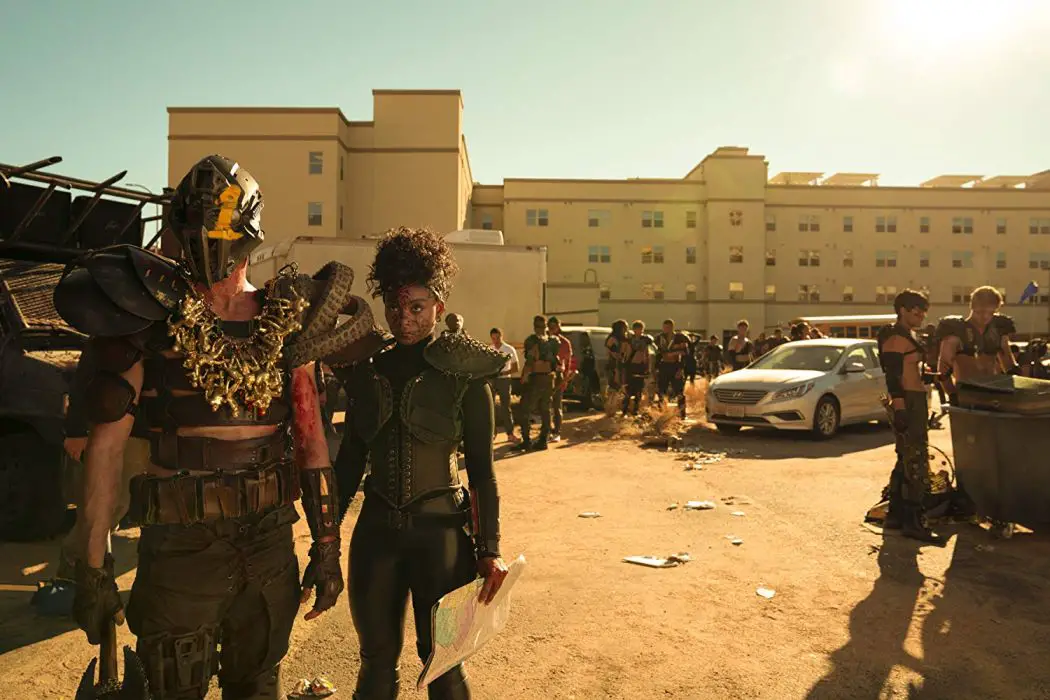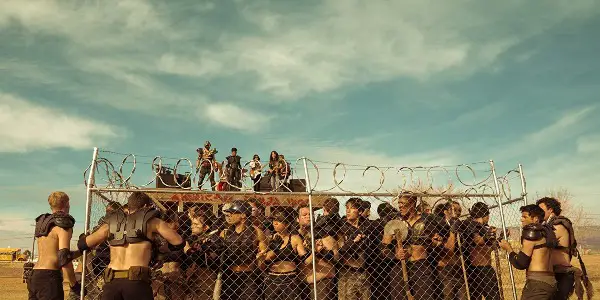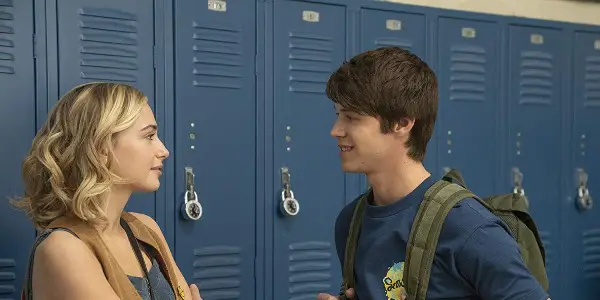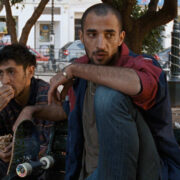DAYBREAK Season 1: A Post-Apocalyptic Mess

Holly is a final year film/journalism student currently living in…
The teenage drama-comedy is a sub-genre we’ve all seen countless times before, the usual tropes consisting of various stereotypical clicks (jocks, nerds, cheerleaders) that play against each other, and an outcast protagonist on a journey of self-discovery. Daybreak takes this formula and adds the twist of a post-apocalyptic society, where, after a nuclear explosion, those under the age of eighteen have divided into “tribes” that reside in various districts of Los Angeles, whilst adults have been turned into “ghoulies” – zombie-like creatures with low-intelligence that feed on human skin.
Lacking a subtle touch
The outcast in this series’ version is Josh Wheeler (Colin Ford), who also plays as the audience’s key to the story (though, as is often the case in teenage dramas, he is the kind of outsider who is coincidentally attractive and charismatic), and is on a journey to find his girlfriend Sam (Sophie Simnett) after their separation during the chaos of the explosion.
Soon enough Josh is accompanied by sidekicks he knew in his previous life; Angelica (Alyvia Alyn Linda), the borderline sociopathic, quick-witted pre-teen who Josh use to babysit, and Wesley (Austin Crute), the bully turned pacifist intent on keeping the peace and making up for his past. To top off the main cast, we have Matthew Broderick as the meek, kind-hearted school principal who frequents Josh’s flashbacks for reasons which are revealed around half-way through the series.

Though the conflict of the story is primarily Josh’s search for Sam, the main trio are thrust into various situations that put their survival skills to the test, as they navigate a Mad Max-esque world ruled by violent, merciless jocks. Visually bold and ambitious, the show continuously breaks the fourth wall during exposition to explain flashbacks or to make a self-referential joke. Though it continuously makes a point of showing this self-awareness through self-depreciation, it often follows this with cliches in the form of dialogue, music, and characterisation. As a result, the show’s tone and voice are sporadic and unclear, making it difficult for the viewer to immerse themselves into the story.
Drawn out action sequences that should be high-stakes feel inconsequential and lack any kind of emotional pull; scenes that are comedic forcefully transition into dramatic beats that don’t quite land, then back again within the space of a single scene. An over-reliance on pop culture references and internet slang also plague this series from start to finish, and it’s not long before you feel completely exhausted due to the incessant meta-storytelling and pandering, campy dialogue that isn’t nuanced in the slightest.
Still, the cinematography is clever at times, and the editing is creative, making for some visually interesting sequences and disturbing visual effects; whip pans, fast-paced editing, and hints at visual comedy at least give the show an energetic feel that has the potential to hold your attention. The low saturation and dark colour palette are effective in communicating the gritty nature of the world, and though the settings in which the characters find themselves are largely repetitive, the production design of these sets are done well. While technically speaking the show proves itself to be more than competent, the mismatched blend of realism and absurdity (particularly with respect to its representation of violence), as well as a tone that is all over the place mean these positive aspects get continuously dragged down by the viewer simply asking: but what’s the point?
Poor characterisation
Daybreak’s irreverent tone and casual nature mean characters come across as not really experiencing anything significant, and the dramatic aspects of the narrative feel unearned. This, in turn, affects the world-building; though we’re given snippets of information about the various tribes and the war between them, very little is divulged as to the state of America, how the nuclear blast occurred, and exactly why adults have been transformed into slow-witted zombies. Consequently, the stakes feel low.

As is the case with most of these characters, protagonist Josh is severely uninteresting, and his development as a character is lacking in any kind of depth or accessible motivation. This is a problem, as he is the audience’s gateway to the world, directly conversing with the camera or providing voice-over narration for the majority of the series. His romance with the typical “girl next door” Sam is portrayed through a few touching scenes, though, like the majority of the series, becomes tiresome and sickly sweet at times. An exception to this is Matthew Broderick as Principal Burr, whose endearing performance is undoubtedly the shining light of the series.
Whilst the show takes the time to show the backstories of the three principal characters, these flashback episodes are predictable, drawn-out, and lack any substance or real reason for existing. Instead, the creators focus on including as many references as possible, beating us over the head incessantly with nods to cultural staples such as Ferris Bueller’s Day Off and Star Wars, and insisting that their take on the genre has flipped the script entirely – particularly in the first few episodes. At the mid-way point of the series and again in the final episode, the show boasts a “twist” that unfortunately can be spotted a mile away. Season 2 anyone?
Daybreak: Conclusion
To be honest, these criticisms wouldn’t matter quite as much if the show was consistently funny, which seems to be the foremost priority of the creators. While there are definitely some laughs to be had, they end up being few and far between and often come across as being overly ambitious, trying too hard to win over the audience.
The show’s attempt to touch on current social and political issues is appreciated, but again, feels over-used throughout the script and lacks the nuanced touch that would’ve helped the intended message. Daybreak is a show begging not to be analysed, instead designed to be consumed mindlessly in one sitting over the Halloween season.
Have you seen Daybreak? How does it compare to other Films/TV you watched over the Halloween season?
Watch Daybreak
Does content like this matter to you?
Become a Member and support film journalism. Unlock access to all of Film Inquiry`s great articles. Join a community of like-minded readers who are passionate about cinema - get access to our private members Network, give back to independent filmmakers, and more.
Holly is a final year film/journalism student currently living in Queensland, Australia. She is an all-around movie enthusiast, though currently her favourite directors include Wes Anderson, Martin McDonagh, and Alfonso Cuarón.













